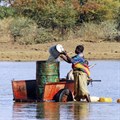Climate resilience must be at the heart of all investments across Africa. Knowledge is the critical ingredient to move the scale of climate resilience. To provide tools to assess a project's climate resilience, in May this year the first ISO standard - ISO/CD 14091 Adaptation to Climate Change - Principles, requirements and guidelines - for climate resilience will be launched.
The standard will help organisations of all kinds put in place a structure to help them prepare for changes in weather patterns and implement adaptation measures.
“ISO is a standard used globally. This standard is quite a watershed as it is the first tool to provide guidance on climate resilience planning,” said Aage Jorgensen, programme manager, Nordic Development Fund (NDF).
“Climate risk has to be added as a factor when considering projects in Africa now,” he adds. Investments are crucial if climate resilience infrastructure projects are to be long term. This requires flexibility in design or in 10 to 15 years the infrastructure will need costly changes or to be replaced.
A panel at the Fourth Africa Climate Resilience Investment Summit (ACRIS IV), which took place recently at the Sandton Convention Centre, discussed what is needed to ensure climate resilience is delivered. The main aim of the summit was to attract international private investors and development agencies to invest in infrastructure resilient projects in Africa.
Ensuring climate resilience
There is no big bang approach to this said Jonathan First, lead specialist, Product Innovation Unit, Development Bank of Southern Africa (DBSA). “The only way to get our big bang is through the convergence of a number of small projects.”
He believes the biggest problem Africa faces is not money. “The continent has not even begun to tap into the funds available. The real challenge is taking climate infrastructural projects from feasibility to bankability. It involves phases, of which the most important is political will. Failure of which means nothing gets off the ground,” he said. That is the first element needed for success. The second is an enabling environment.
“Legislation and regulation are crucial to launching any project in Africa. If the enabling environment is not there, you can chase as many projects as you want, they will not happen.”
Lastly is the understanding and identifying of catalytic projects. “If this is done, then the finances and resources will become available,” he said. He added that the private sector must be more important in solving climate issues, while government must provide the framework for the private sector to develop projects.
Prioritising projects
Political will exists at strategic level in Africa, said Worknesh Mekonnen Gonet, director and representative to the African Union, UNOPS Ethiopia Operational Hub (Ethiopia, Sudan and Djibouti). “The critical challenge we face is whose priority are we chasing? Is the project a priority for the political dispensation or climate resilience? Politicians want to showcase a project, and do it quickly, but climate resilience project management is not a quick fix,” he said.
Jasper Cook, chief technical advisor, UKAID-DFID Funded recap Programme believes climate impact is blamed for a lot of things it should not be blamed for. “Our current road networks are vulnerable to our current climate, never mind the future climate. But we cannot blame climate impact for that now. We need to be clear what we want to do with our road networks in the future as we cannot make every road climate resilient.”
The summit was hosted by GRV Global with key partners the World Bank Group, Nordic Development Fund (NDF) through the) Africa Climate Resilient Investment Facility Partnership (AFR-RES) and the United Nations Economic Commission for Africa (ECA).





























